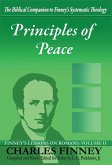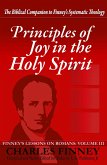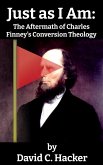Charles G. Finney became the greatest American preacher and theologian of the Nineteenth-Century. He traveled as an evangelist and revivalist in America and abroad, served in settled pastorates, taught as a professor of theology, promoted the abolition of slavery and equal rights, helped found and served as President of Oberlin College. Just as one cannot understand the Great Awakening without studying Jonathan Edwards, one cannot understand the great revivals and the theological and social movements in Nineteenth-Century America without studying Charles G. Finney. Because Finney's teachings remained true to the Bible and common sense, his message transformed thousands.
In this new Finney's Principles series book, the Study Questions by the editor and the Commentary by Henry Cowles will help you apply Finney's teachings.
The Expanded E-Book Edition of "Principles of Righteousness: Finney's Lessons on Romans, Volume I" will continue the Finney's Principles series, which began with the publication of Finney's "Principles of Prayer" in 1980. L.G. Parkhurst, Jr., the compiler and editor of the Finney's Principles series, will complete Finney's Lessons on Romans, with "Principles of Peace: Volume II" and "Principles of Joy in the Holy Spirit: Volume III". The Expanded E-Book Edition of "Principles of Righteousness" contains two bonus lessons from "Principles of Peace" and "Principles of Joy in the Holy Spirit."To learn more about the Finney's Principles series and find additional study resources, visit FinneysPrinciples.com and AgionPress.com.
These three new Finney's Principles Series book titles are based on the verse from Romans: "For the kingdom of God is not a matter of eating and drinking, but of righteousness, peace and joy in the Holy Spirit"-Romans 14:17.
Dieser Download kann aus rechtlichen Gründen nur mit Rechnungsadresse in A, B, CY, CZ, D, DK, EW, E, FIN, F, GR, H, IRL, I, LT, L, LR, M, NL, PL, P, R, S, SLO, SK ausgeliefert werden.









